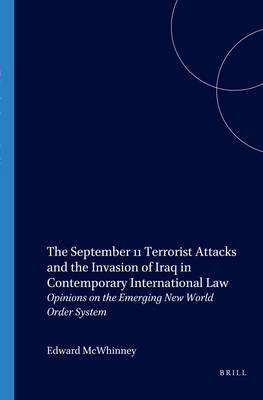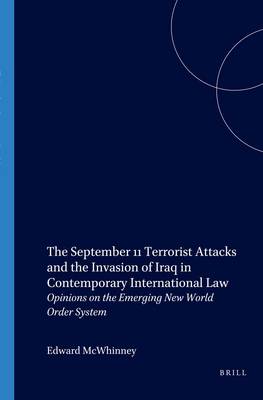
- Afhalen na 1 uur in een winkel met voorraad
- Gratis thuislevering in België vanaf € 30
- Ruim aanbod met 7 miljoen producten
- Afhalen na 1 uur in een winkel met voorraad
- Gratis thuislevering in België vanaf € 30
- Ruim aanbod met 7 miljoen producten
Zoeken
The September 11 Terrorist Attacks and the Invasion of Iraq in Contemporary International Law
Opinions on the Emerging New World Order System
Edward McWhinney
€ 62,32
+ 124 punten
Omschrijving
The US administration's pursuit of the Al-Qaeda organisation and Taliban régime in Afghanistan, responsible for the September 11, 2001 international terrorist attacks, was supported by an international "coalition of the willing" and backed by the full legal authority of UN Security Council Resolutions. The US bid to follow this successful multilateral initiative with similar armed intervention against Saddam Hussein's government failed to rally support in the Security Council. The US then proceeded to act unilaterally, and with British military support, to invade Iraq.
The problems for contemporary international law and the UN Charter based World Order system posed by the conflicts within the Security Council and the assorted legal claims advanced, such as a revived doctrine of Humanitarian Intervention; régime change as a justification for intervention; Preemptive military strikes as an exercise in Self-defence; and Multilateralism versus Unilateralism in the exercise of the Peace and Security powers under the UN Charter, are canvassed in the present collection of legal opinions.
The problems for contemporary international law and the UN Charter based World Order system posed by the conflicts within the Security Council and the assorted legal claims advanced, such as a revived doctrine of Humanitarian Intervention; régime change as a justification for intervention; Preemptive military strikes as an exercise in Self-defence; and Multilateralism versus Unilateralism in the exercise of the Peace and Security powers under the UN Charter, are canvassed in the present collection of legal opinions.
Specificaties
Betrokkenen
- Auteur(s):
- Uitgeverij:
Inhoud
- Aantal bladzijden:
- 112
- Taal:
- Engels
- Reeks:
- Reeksnummer:
- nr. 61
Eigenschappen
- Productcode (EAN):
- 9789004141438
- Verschijningsdatum:
- 20/08/2004
- Uitvoering:
- Paperback
- Formaat:
- Trade paperback (VS)
- Afmetingen:
- 238 mm x 128 mm
- Gewicht:
- 213 g

Alleen bij Standaard Boekhandel
+ 124 punten op je klantenkaart van Standaard Boekhandel
Beoordelingen
We publiceren alleen reviews die voldoen aan de voorwaarden voor reviews. Bekijk onze voorwaarden voor reviews.











